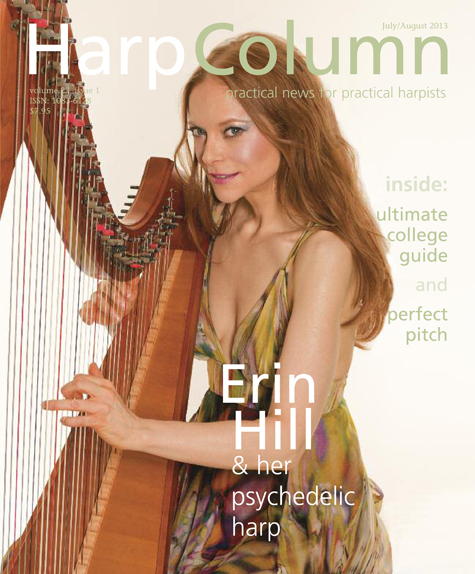—by Haley Rhodeside
Going for the gold—the second time around.
 The year was 2009, and it was sometime early in December. I was having my last lesson of the semester, my first semester at Indiana University (IU) as a freshman studying with Susann McDonald. I don’t remember exactly what I played during that lesson, but it must have gone fairly well because towards the end, Ms. McDonald asked me, “Honey, are you sure you don’t want to do the USA Competition?”
The year was 2009, and it was sometime early in December. I was having my last lesson of the semester, my first semester at Indiana University (IU) as a freshman studying with Susann McDonald. I don’t remember exactly what I played during that lesson, but it must have gone fairly well because towards the end, Ms. McDonald asked me, “Honey, are you sure you don’t want to do the USA Competition?”
Before Ms. McDonald asked me that fateful question, I had thought I was sure about not competing in the USA International Harp Competition. I had plenty of reasons not to compete—I was still young and inexperienced (having just turned 18 two weeks prior), and while I had participated in some competitions before, none were of this prestige or difficulty. But perhaps most importantly, we were six months out from the 2010 competition, and I knew absolutely none of the repertoire.
[protection_text]
So why did I agree to do it? Well, my thought process went about like this: “Why not?” I wanted to push myself to learn more music than I ever had in such a short time, and the looming, inexorable approach of the competition provided both the goal and the deadline. It’s also hard to say no when the founder of the competition is the one asking you to participate. Of course I did not expect to win (in fact, it would have been a pleasant surprise to make it past the first stage), but the experience was great, and it was a personal accomplishment to learn the repertoire.
As the 2013 USA International Harp Competition approached, I knew that I wanted to participate again, and to do it properly this time. It’s not that I wasn’t serious in 2010, but I was more than a little scared, unsure, and had very little time to prepare.
This time around my preparation has been less like a sprint and more like a journey. I am surprised how much it has taught me about my own musical mastery and style of learning. I began working on the repertoire more than a year and a half ago, allowing me time to become more polished and seasoned on each piece. Perhaps more importantly, my extended preparation time allowed me to let some pieces “breathe.” For example, the Fauré Impromptu was one of the first pieces I learned for the competition. After I learned it, I set it aside to tackle other repertoire. In the time since I first learned the Impromptu, I have “relearned” it two or three times, bringing it back for various performances and recitals. During each relearning, I have discovered some new musical facet of the piece, some way to make it better.
My most recent performance of the Fauré was for my senior recital a little over a month ago. Now, that piece has been played ad nauseam at IU over the past year because there are six of us from the IU harp studio who are USA contestants. It could usually be heard coming from at least one harp practice room in the halls of the music school, and it was rare when no one performed it in our weekly masterclass. Suffice it to say, the Impromptu was probably the last piece anyone wanted to listen to again at my recital. And yet afterward, one of my fellow harpists told me that my performance made her want to learn the Impromptu. It was probably the most gratifying compliment I could have received, and I think I was able to give a musical interpretation I could finally be satisfied with because of the months of polishing and evolution I had been through with that piece. That, I think, is why harpists will devote nearly two years of their lives to intense preparation for this competition—it’s one thing to learn a piece, and it’s quite another to learn it to the best of your ability and to discover new musical nuances through extended practice and performance.
The 2013 USA Competition kicks off in a little more than a month, and I’m certain the competition itself will be quite a different ball game for me this time, just as the preparation has been. There are over 50 contestants this year—talented harpists from all over the world who have put in countless hours of work—yet at least half of us will not make it past the first stage. This was easier to brush off when I had only spent six months working toward USA rather than a year and a half. It’s difficult. It’s extremely competitive. Is it worth it? Absolutely. USA International is an unparalleled learning opportunity. And I would like to think that as long as I work hard and play my best, I will be satisfied with my performance no matter what the outcome. •
Haley Rhodeside competes this month in the 7th USA International Harp Competition in Bloomington, Ind. She recently graduated from IU with degrees in harp performance and mathematics. She will attend Yale University in the fall to pursue a master’s degree.
Talk To Us
Sounding Board is a place for your opinion and commentary about harp-related issues. (Opinions do not necessarily reflect those of the Harp Column editorial staff.) If you have an opinion about something affecting today’s harpists, tell us in 800 words or less. We’ll pay you $100. Send submissions to: areese@harpcolumn.com.






